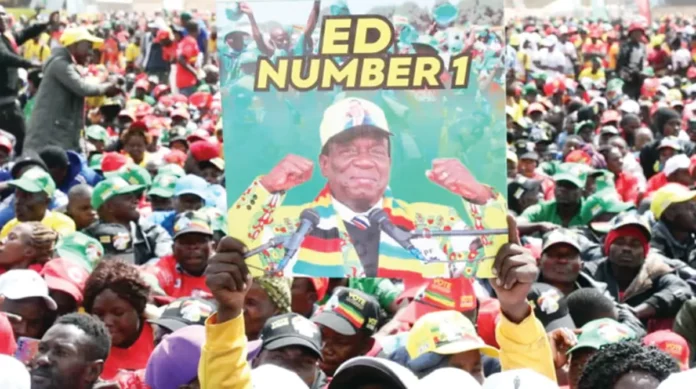Harare – Tensions are escalating within Zanu-PF, with reports emerging of planned protests against a vocal critic of President Emmerson Mnangagwa’s purported bid to extend his term beyond 2028. The planned demonstrations, reportedly organised by Zanu-PF structures in the Midlands and Masvingo provinces, target suspended Children of War Veterans Association of Zimbabwe (COZWVA) leader Munyaradzi Shoko, a prominent opponent of the so-called “2030 agenda.”
The “2030 agenda” refers to efforts by some within Zanu-PF to amend the Constitution and allow President Mnangagwa to extend his tenure beyond the constitutionally mandated two terms, which are expected to end in 2028. Despite President Mnangagwa’s repeated public pronouncements that he will retire at the end of his second term, his loyalists, particularly in Midlands and Masvingo provinces, are actively pushing for constitutional amendments to facilitate his continued leadership, Newday has reported.
However, even if the Constitution were to be amended, the supreme law of the land explicitly states that an office bearer cannot benefit from an amended statute. This legal constraint casts doubt on the feasibility of the 2030 agenda, yet the continued pursuit of this goal has fuelled speculation and division within Zanu-PF.
Shoko, a former Zanu-PF member who has been outspoken in his opposition to the 2030 agenda, has openly rallied critics of the President to resist these efforts. His activism has drawn the ire of Zanu-PF loyalists, who view him as a threat to the party’s plans.
This opposition has intensified following the recent unexpected death of Paddington Tupiri, a founding member of COZWVA and a former Central Intelligence Organisation (CIO) agent, who passed away at the age of 35 under unclear circumstances. COZWVA announced Tupiri’s death via social media, stating only that he celld “under unclear circumstances,” leaving many to speculate.
Chaplain Chirume, a Zanu-PF member in Midlands, confirmed the planned protests against Shoko, stating, “We are against those attacking our party and our President. Our leader is President Emmerson Mnangagwa until 2030, that is when we are going to start to talk about succession…”
Chirume added that the dates for the protests are still being finalised in consultation with relevant authorities. Posters bearing Chirume’s contact details have already been distributed, indicating active organisation of the planned demonstrations.
Zanu-PF director for information, Farai Marapira, responded to the controversy by stating that the party has only one centre of power: “He (Shoko) is not a member of the party. He is not supposed to talk about our own internal issues. We only have one leader and centre of power and that is only President Emmerson Mnangagwa.”
This statement underscores the party’s firm stance against dissent and its commitment to maintaining Mnangagwa’s authority.
Shoko, however, remains defiant. He accused Zanu-PF of attempting to violate the Constitution and asserted his right to freedom of speech.
“As the children of war veterans, we are the vanguard of morals and ethics of the war of liberation struggle… 2030 is not a Zanu PF thing, but it is now of national interest because it is the Constitution which is being violated. It was agreed in 2013 that there is no room to violate the Constitution. President Emmerson Mnangagwa and his party must not be allowed to violate the Constitution,” he said.
He also expressed concerns for his personal safety, stating, “At the moment, my life is in danger as I have been critical of this 2030 agenda, but I will not stop as we have a right to freedom of speech.”
The 2030 agenda has clearly created deep divisions within Zanu-PF, exposing underlying tensions and power struggles. The recent cell restructuring exercise further highlighted these divisions, with loyalists of both Mnangagwa and his deputy, Constantino Chiwenga, vying for control of party structures.












